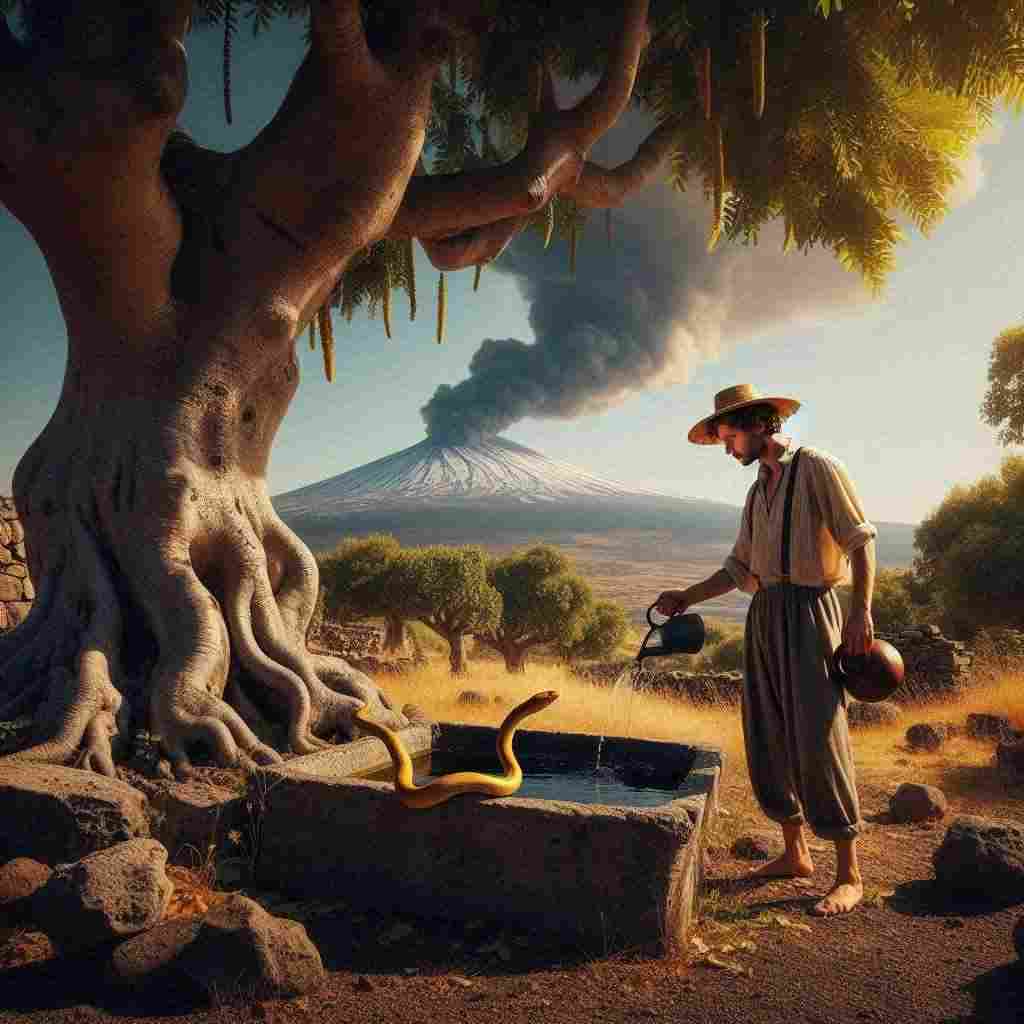Snake
D. H. Lawrence
1885 to 1930

A snake came to my water-trough
On a hot, hot day, and I in pyjamas for the heat,
To drink there.
In the deep, strange-scented shade of the great dark carob tree
I came down the steps with my pitcher
And must wait, must stand and wait, for there he was at the trough before me.
He reached down from a fissure in the earth-wall in the gloom
And trailed his yellow-brown slackness soft-bellied down, over the edge of the stone trough
And rested his throat upon the stone bottom,
And where the water had dripped from the tap, in a small clearness,
He sipped with his straight mouth,
Softly drank through his straight gums, into his slack long body,
Silently.
Someone was before me at my water-trough,
And I, like a second-comer, waiting.
He lifted his head from his drinking, as cattle do,
And looked at me vaguely, as drinking cattle do,
And flickered his two-forked tongue from his lips, and mused a moment,
And stooped and drank a little more,
Being earth-brown, earth-golden from the burning bowels of the earth
On the day of Sicilian July, with Etna smoking.
The voice of my education said to me
He must be killed,
For in Sicily the black, black snakes are innocent, the gold are venomous.
And voices in me said, if you were a man
You would take a stick and break him now, and finish him off.
But must I confess how I liked him,
How glad I was he had come like a guest in quiet, to drink at my water-trough
And depart peaceful, pacified, and thankless,
Into the burning bowels of this earth?
Was it cowardice, that I dared not kill him?
Was it perversity, that I longed to talk to him?
Was it humility, to feel so honoured?
I felt so honoured.
And yet those voices:
If you were not afraid, you would kill him!
And truly I was afraid, I was most afraid,
But even so, honoured still more
That he should seek my hospitality
From out the dark door of the secret earth.
He drank enough
And lifted his head, dreamily, as one who has drunken,
And flickered his tongue like a forked night on the air, so black,
Seeming to lick his lips,
And looked around like a god, unseeing, into the air,
And slowly turned his head,
And slowly, very slowly, as if thrice adream,
Proceeded to draw his slow length curving round
And climb again the broken bank of my wall-face.
And as he put his head into that dreadful hole,
And as he slowly drew up, snake-easing his shoulders, and entered farther,
A sort of horror, a sort of protest against his withdrawing into that horrid black hole,
Deliberately going into the blackness, and slowly drawing himself after,
Overcame me now his back was turned.
I looked round, I put down my pitcher,
I picked up a clumsy log
And threw it at the water-trough with a clatter.
I think it did not hit him,
But suddenly that part of him that was left behind convulsed in undignified haste,
Writhed like lightning, and was gone
Into the black hole, the earth-lipped fissure in the wall-front,
At which, in the intense still noon, I stared with fascination.
And immediately I regretted it.
I thought how paltry, how vulgar, what a mean act!
I despised myself and the voices of my accursed human education.
And I thought of the albatross,
And I wished he would come back, my snake.
For he seemed to me again like a king,
Like a king in exile, uncrowned in the underworld,
Now due to be crowned again.
And so, I missed my chance with one of the lords
Of life.
And I have something to expiate:
A pettiness.
D. H. Lawrence's Snake
D.H. Lawrence's poem "Snake" is a powerful exploration of the conflict between instinct and societal conditioning, set against the backdrop of a chance encounter with a serpent. The poem's narrative unfolds as a first-person account, drawing the reader into the speaker's internal struggle as he grapples with his conflicting reactions to the snake's presence at his water-trough.
The poem opens with a vivid description of the setting, immediately establishing the sweltering heat of a Sicilian summer day. The speaker, clad in pajamas, descends to his water-trough only to find a snake already there. This initial encounter sets the stage for the central conflict of the poem: the tension between the speaker's fascination with the snake and the societal imperative to view it as a threat.
Lawrence's use of imagery is particularly striking throughout the poem. He describes the snake in sensuous detail, emphasizing its "yellow-brown slackness" and "soft-bellied" form. This language serves to humanize the creature, presenting it not as a menacing predator but as a fellow being seeking respite from the heat. The poet's choice to anthropomorphize the snake, describing it as drinking "softly" and looking around "like a god," further reinforces this sense of kinship between man and beast.
The speaker's initial reaction to the snake is one of reverence and admiration. He feels "honoured" by its presence, viewing the creature as a "guest" at his water-trough. This response reflects a primal connection to nature, unsullied by societal norms or learned behaviors. However, this instinctive appreciation is quickly challenged by "the voice of my education," which insists that the snake "must be killed." This internal dialogue represents the core conflict of the poem: the struggle between innate human instincts and socially conditioned responses.
Lawrence uses this conflict to critique the way society shapes our perceptions and actions. The voices urging the speaker to kill the snake represent societal expectations of masculinity and dominance over nature. The speaker's reluctance to act on these impulses is framed as potentially stemming from "cowardice" or "perversity," highlighting the pressure to conform to societal norms even when they conflict with one's personal feelings or moral judgments.
The poem's turning point comes when the snake begins to retreat. The speaker, overcome by a "sort of horror" at the snake's withdrawal, acts on impulse and throws a log at the water-trough. This action, driven by a complex mix of emotions including fascination and fear, leads to immediate regret. The speaker condemns his own behavior as "paltry," "vulgar," and "mean," recognizing that he has betrayed his own instincts and squandered a rare opportunity for connection with a wild creature.
Lawrence's reference to Coleridge's "The Rime of the Ancient Mariner" through the mention of the albatross serves to underscore the spiritual significance of this encounter. Just as the mariner's killing of the albatross was a crime against nature, the speaker's aggression towards the snake represents a failure to honor the sanctity of the natural world.
The poem concludes with a sense of loss and missed opportunity. The speaker elevates the snake to regal status, describing it as "a king in exile, uncrowned in the underworld, / Now due to be crowned again." This imagery suggests a recognition of the snake's inherent nobility and its rightful place in the natural order. The final lines, in which the speaker acknowledges his need to "expiate: / A pettiness," serve as a powerful indictment of human arrogance and our tendency to act destructively towards nature due to fear and societal conditioning.
Through its vivid imagery, complex characterization, and exploration of internal conflict, "Snake" offers a profound meditation on humanity's relationship with nature. Lawrence challenges readers to question their learned responses to the natural world and to recognize the value in embracing our instinctive connections to other creatures. The poem serves as a poignant reminder of the consequences of allowing societal expectations to override our innate sense of wonder and respect for the natural world.
This text was generated by AI and is for reference only. Learn more
Want to join the discussion? Reopen or create a unique username to comment. No personal details required!



Comments
No comments yet. Be the first to comment!